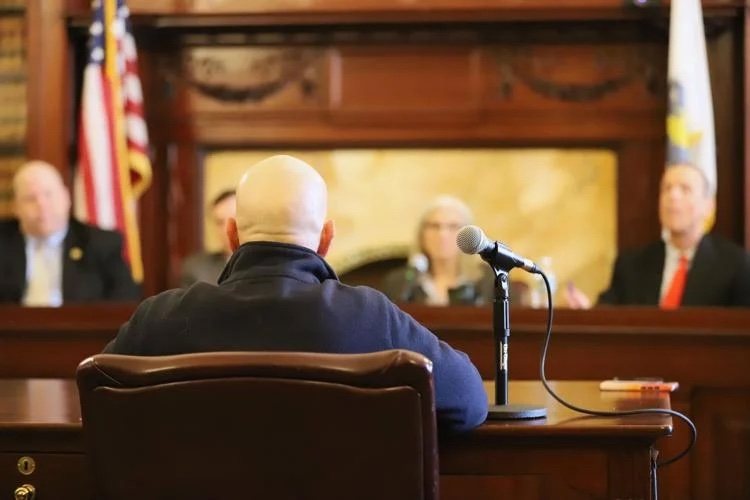latest
Massachusetts Democrats use hearing to continue delay of 72% voter approve legislative audit

By Sam Drysdale
Constitutional experts invited by Senate Democrats to testify Wednesday said that allowing a voter-approved audit of their chambers to take place could lead to “executive control” and “indirect interference” in the legislative process.
However, another legal expert testifying before a Senate’s subcommittee on the new audit law said it is within the state auditor’s legal rights to probe the Legislature, and argued that lawmakers should not preemptively dismiss the audit based on hypotheticals that the auditor’s office would overstep its authority.
“The power to investigate the General Court could threaten to undermine its basic functioning,” said Lawrence Friedman, a constitutional law professor at New England Law Boston. Friedman is the author of a constitutional law casebook and edited Oxford University Press’s series on American state constitutions.
Friedman argued that an audit performed by the elected state auditor, a constitutional officer under the executive branch, could lead to “indirect interference” with how the Legislature conducts itself.
“There lies the possibility that an unscrupulous auditor would use the opportunity to audit these functions as a wedge with which to subject the General Court to continuous audit requests, and should the Legislature fail to respond to the auditor’s satisfaction, litigation over those requests, which ultimately could undermine the Legislature’s ability to conduct its constitutionally assigned business on its own terms,” he said.
Auditor Diana DiZoglio, who has made the legislative audit a top priority, was invited to testify at the hearing but declined, according to subcommittee Chair Sen. Cindy Friedman’s office.
“The Senate is determined to malign the work of our office — at all costs — to block the public from being able to view the basic financial and contracting records we have requested,” DiZoglio said in a statement shared with the News Service. “We did not participate in the Senate’s unconstitutional show trial, purported to be a hearing. Senators are not judges and their actions in deciding whether or not they have to follow the law — by holding a kangaroo court on this matter — blatantly violates the Constitution which states that the power to interpret the law rests with the Judiciary — not with the Legislature. Accordingly, I call on the Legislature to immediately seek an SJC opinion on this matter.”
One of the key issues in the debate is the scope of the audit that DiZoglio intends to perform. Lawmakers have said they need more information from DiZoglio about what she’d be looking for, and Attorney General Andrea Campbell has also said she needs more information about the scope, as DiZoglio has asked Campbell to enforce the law.
Friedman, however, said even a more limited scope “administrative audit,” as opposed to an audit examining “core legislative functions,” would still challenge the separation of powers.
Any investigation into communications and documents shared between legislators and staff could interfere with deliberative process privilege, he said. This privilege protects the internal communications and documents between legislators and staff during negotiations, aimed at allowing for more open debate outside of the public eye.
Ray La Raja, a professor of political science at UMass Amherst who specializes in constitutional democracy, campaign finance and election laws, agreed with Friedman.
“The public needs to understand, and this is something very hard to convey, that a deliberative process sometimes requires people to speak frankly outside the public eye, and that’s a tough one to explain… It will have a chilling effect when the executive can interfere and pose questions and reveal dialogue you’re having,” La Raja said.
Lawmakers have resisted complying with the audit law three months after it went into effect, largely under this unresolved separation of powers argument.
La Raja told senators Wednesday that the voter law challenges “legislative independence… exactly at a time when the premier legislative institution in America, Congress, has never been weaker.”
President Donald Trump has signed over 100 executive orders during his first two months in office, prompting some watchdogs to raise alarms around executive overreach.
“With their power seized by an executive at dangerous levels at this time, state Legislatures should be the exemplars of legislative independence. They are the bulwarks against executive overreach, and principal guardians of representative democracy — the idea that government should be divided into three distinct, co-equal branches,” he said.
However, the third speaker invited to testify Wednesday, retired attorney and advocate for legislative reform Jeanne Kempthorne, said the comparison of the Trump administration is not directly applicable.
“So, if Elon Musk were to propose to audit Congress and to say, ‘Give me access to your data systems and my whiz kids are going to identify some issues for your improvement.’ Would that be something you’d advise Congress to consent to? … and how is that different than this?” Sen. William Brownsberger asked Kempthorne.
She responded that the auditor is directly elected by the voters. Kempthorne later added that the auditor serves in a different capacity than the president of the U.S. or governor of a state, and that though the auditor is under the executive branch, she does not report to the governor.
“Elon Musk is not the state auditor. Elon Musk has no authority, but it’s clearly an intrusion on the functioning, the core functioning of Congress. It’s also unduly burdensome,” she said. “There can be many reasons why that is materially different from what’s being presented here.”
Kempthorne also argued to senators that voters gave DiZoglio the authority to investigate by a considerable 71% threshold of support, and that the Supreme Judicial Court formerly issued an opinion that the auditor’s authority could be “expanded by statute, so long as those enhancements do not impermissibly invade the province of other branches of government.”
Given the strong public support for an audit, she said lawmakers could consent — as previous Legislatures have consented to audits — and if the auditor’s office is unduly burdensome in their requests, harassing towards lawmakers, or asks for documents well beyond a reasonable scope, at that point the Legislature could seek an outside opinion from the courts or attorney general.
“The Legislature, I suggest, should be less focused on abstract legalistic theory and far more concerned about the crisis of public confidence in this institution,” Kempthorne said. “The wise reaction to that crisis of confidence is not to throw more alligators in the moat and reinforce the walls of the citadel, but to allow the audit to proceed unhindered and to commit to far greater transparency.”
She continued, “A frontal challenge to the will of the people, in this historical context, is a mistake. It gravely misreads this moment in history when democratic institutions are under attack.”
Sen. Paul Feeney asked her if lawmakers should knowingly cede their constitutional power to another branch in the name of preserving public good will.
“We need to answer for our colleagues in the Senate, if you take this action and, I think you use the word comply or volunteer for an audit, are you as a legislator who, just months ago, raised your hand to uphold the constitution of the commonwealth — are you knowingly violating that in the interest of political expediency?” Feeney asked.
Kempthorne, a former State Ethics Commission member and former Common Cause board member, replied that she does not believe there is a risk of violating the constitution, based on the SJC opinion that said the powers of the state auditor could be constitutionally enhanced.






